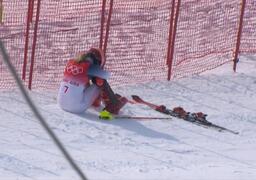 Screenshot Screenshot by Julian Spivey American skier Mikaela Shiffrin shockingly skied out of her second straight event in three days early on in her slalom event on Tuesday, Feb. 8 (in America, it was Wednesday in Beijing) and it led to a lot of conversation. There are two topics I mostly want to discuss surrounding this surprising moment: how NBC covered the event and how we treat female athletes compared to their male counterparts. A lot of viewers of NBC’s Olympic broadcast were angered by the network’s coverage. The network, of course, showed the event live. They showed multiple replays explaining what happened and they focused on Shiffrin’s response to her run, which was to sit on the side of the slope, head down in her arms and this went on for quite a while. Many fans felt the NBC response was exploitative. I saw the word “private moment” written many places online. Honestly, the fact that she didn’t immediately have microphones thrust into her face, as you’d see in most sporting events was about as private as an athlete ever going to get. Athletes know when they’re out competing there isn’t privacy. You’re being covered and when you’re an athlete of Shiffrin’s stature – that is to say the best – you’re going to be a major focus. This will happen whether you’re at the top of your game and winning gold medals and it’s going to happen when you make mistakes and ski off course just seconds into your run. That’s just the way sports coverage and really any news coverage works. It literally is the old “Wide World of Sports” intro “The Thrill of Victory, The Agony of Defeat.” What we’ve seen from Shiffrin in the past was “thrill of victory” and tonight it was “agony of defeat.” You’re going to get both in sports. I don’t know what NBC could’ve done differently. If they don’t cover Shiffrin’s response to her mistake, they aren’t doing their job covering the event in its entirety. Sometimes journalism, which sports broadcasting is, isn’t pretty. That doesn’t mean it should be avoided. If the event had continued right away the network would’ve certainly focused more on the skiers competing. I don’t know if the delay in competition was because of Shiffrin remaining on the slope or not. It wasn’t exploitative. It was just the news. Let’s get to the second part of the discussion in how it feels like how people discuss female athletes during bad performances is expected to be different than how they discuss male athletes. I don’t particularly like the term “choke” when it comes to sports, but it’s so ingrained in the sports lexicon that I don’t know if it’ll ever go away. Maybe it should? But it would just be replaced with something else that basically means the same thing. Despite not really liking the term I wanted to see what response I’d get on social media if I referred to Shiffrin’s disappointment in the slalom as a “choke.” It didn’t go over too well. I wasn’t really surprised, but I was a bit confused. Whenever I’ve seen the term used in similar fashion for athletes like Green Bay Packers quarterback Aaron Rodgers losing another NFL conference championship game or Greg Norman and Jordan Spieth losing big final round leads at the Masters Tournament it’s never been controversial. But using it in this example it certainly was. It led me to wonder if we’re supposed to treat female athletes differently from male athletes and if that’s the expectation then isn’t it a sexist one. If a male athlete can “choke” in a sporting event than a female athlete certainly can too. Maybe the problem is so many people have ascribed Shiffrin’s issues over the last few days as being a part of the grief of her father’s death two years ago? But that’s just a theory folks have – in part because before her first ski a few days ago NBC aired a pre-taped segment with Shiffrin talking about how hard her father’s death hit her. There’s no proof this is why she’s struggled at these games thus far. She certainly (as of late Feb. 8) hasn’t said as much. In fact, she won a gold medal and three other medals at the 2021 World Championships last year just a year after her father’s death. People are just assuming she’s struggling with mental health in much the same way American gymnastics star Simone Biles did at the Tokyo Olympics last summer. I certainly hope Shiffrin’s issues are merely athletic in scope. Until we know otherwise, I think we should treat her struggles as if they are. If that’s the case, her performance should be treated as any other athletes would be. That doesn’t mean we can’t feel bad for her.
0 Comments
Leave a Reply. |
Archives
April 2024
|